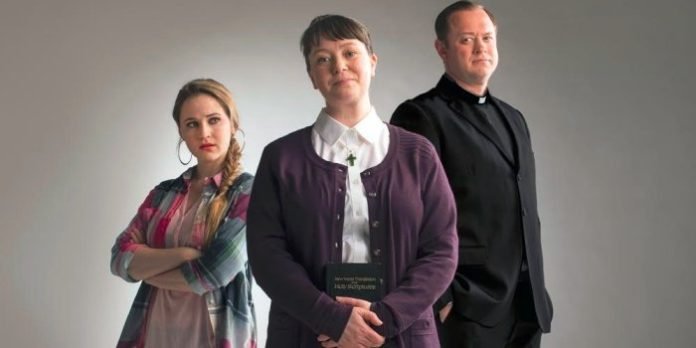In polite society, religion and politics are topics that are usually avoided at all costs. For the playwright however, they can become controversial fodder for deeper exploration. In Sister Judy, playwright Shawn Macdonald stirs the religious pot with a story originally inspired by Tom Harpur’s 2004 book The Pagan Christ.
“I received the book as a gift from a friend who knew I was into issues of spirituality and my background growing up as Catholic,” explains Macdonald. “[The book] really blew mind after I read it, and I knew that it was something that I had to write about.”
In Harpur’s bestselling non-fiction book, he asserts that the New Testament shares a large number of similarities with ancient Egyptian and other pagan religions, and that early Church leaders fabricated Jesus based on those myths.
“Most people believe there is a guy named Jesus, and even that he may not be the son of God, but this book goes beyond that,” says Macdonald. “All the stories of Jesus, the miracles, Mary, the crucifixion, all of that is found in Egyptian mythology that predates Christianity by 5,000 years. What this book suggests is that all that mythological content was simply passed down and eventually got melted together and Christianity started to develop.”
Macdonald says that the only real evidence of Jesus’s existence is what we read about in the Gospels, and that the vary nature of those Gospels meant that they were never to be viewed as historical documents.
“There is no consistency because they are from fragments long before Christianity even existed,” says Macdonald. “Most people you can find in historical documents, but the only thing we have on Jesus is contained in the Gospels.”
Recognizing it is a pretty controversial subject, Macdonald says it was something he would not have considered himself, had he not felt that Harpur’s research was solid.

“In the end though Harpur himself says it doesn’t really matter. The literal Christ has no bearing on the truth of Christianity,” says Macdonald. “We are all children of God and the point of the Christ myth is God incarnate in humankind. It isn’t about this superpower, it is about the fact we are God and we are all Devine creatures.”
Some pretty heady and provocative stuff from someone who left the Catholic Church when he was 20-years old.
“I would no longer consider myself religious at all,” admits Macdonald. “I am deeply spiritual and am interested the ideas of spirituality, but I’ve outgrown the need for religion.”
Originally commissioned eight years ago as part of the Arts Club’s Silver Commissions Project, Macdonald does admit that Sister Judy has changed since he was first inspired by Harpur’s book.
“I grew up and went to Catholic school, even university, and was taught by nuns and priests. My father was studying to be a priest when he met my mom. The clergy was always a big part of our life and I knew that I wanted to write a story about a priest and nun,” says Macdonald. “We know little about the lives of nuns and priests outside their place in the Church and the everyday human experiences that they have. I was interested in creating people that had bodies, and desires and be able to look at them as real people.”
While still keeping some of the controversial theories from The Pagan Christ, Macdonald ultimately shaped a story about a flesh-and-blood nun, a popular university theology professor, who’s beliefs are challenged by a student.
“During the development process, the play become less theological and more personal, and focuses on the sacrifices that Sister Judy has made in order to live within the church as a cleric,” says Macdonald. “It isn’t about taking down the Catholic Church, although I will be the first to admit that the Catholic Church is probably the last place you’d want to go to experience God.”
What became important for Macdonald during the writing process was to tell the stories of those people inside that institution, and in creating a nun who could help bring some of his ideas into focus.
“When I wrote the first draft I was really drunk on the book,” Macdonald says. “The first drafts were really heavy with what I read, and it tipped the play into a really intellectual debate. While it was really interesting and compelling, what I was more interested in was the people.”
Working with dramaturg Rachel Ditor, Macdonald realized that the play needed to be more about what the characters were doing, rather than what the characters were talking about.
“As an audience we need a way in and people to relate to, and as I got to know Judy more, I realized she was really who I was interested in, and less about God and truth. It wasn’t about me being right, and more about the relationships.”
Sister Judy plays the Revue Stage (1601 Johnston Street, Granville Island) February 26 – March 21. Visit https://artsclub.com for tickets and information.

